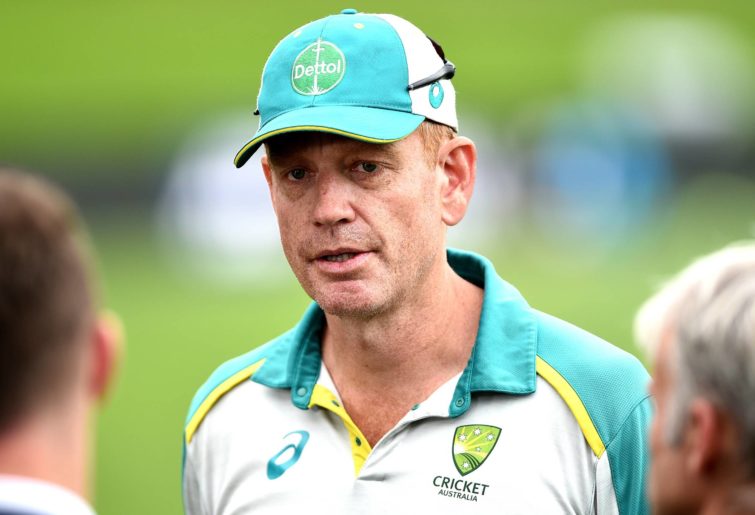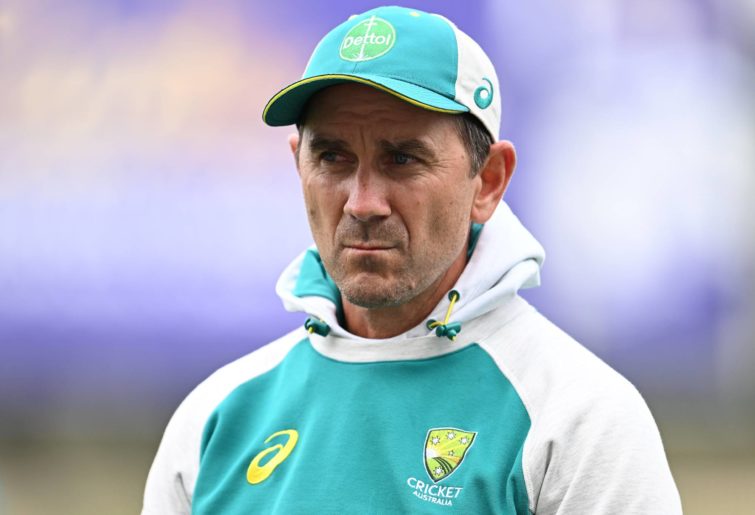Justin Langer had troubling mood swings and was too intense for some of his players, who grew sick of walking on eggshells in his presence.
His interim replacement, Andrew McDonald, couldn’t be more different.
“You couldn’t tell if he’d won or lost a game at times – his heart rate just stays the same,” said one of his former players who spoke to The Roar about the new man in charge of the national men’s cricket team.
McDonald isn’t a bin kicker, overly emotional, or prone to the kind of melodramatic self-righteousness found in Langer’s exit email to Cricket Australia on the weekend.
“Through this time, and throughout my tenure, I have held myself with integrity and dignity,” said Langer – whose mates Mitchell Johnson and Matthew Hayden did the dirty work, calling Pat Cummins ‘gutless’ and his statements falling short of glowing support ‘garbage’.
“My life has been built on values of honesty, respect, trust, truth, and performance and if that comes across as ‘too intense’ at times, I apologise.”
Langer’s demise has been in full public glare through the rage whipped up by his ex-teammates. In contrast, McDonald is described by those who know him as intensely private, and few have gone on the record at length about his methods, knowing he likes to keep everything close to his chest.
While he’s stamped his knowledge and authority on every cricket department he’s been a part of, he has barely spoken a breath to the media about the substance of his craft.
It’s intriguing that two of the most in-depth interviews he’s ever given were six years ago for Cricinfo, when he had just joined Leicestershire as a first time head coach, and last year to a podcast covering Lowerhouse Cricket Club in England, where he’d once played.
So what of his philosophy, and what will Australia’s elite cricketers get from his leadership?
“Communication’s everything,” McDonald said in 2016. “The ability to coach is the ability to connect with your players.”
He says this means getting to know players individually, understanding what “makes them tick behind the scenes as well. So creating a whole picture of your players – and that allows you then to try to bring out the best of them.
“I’m not a huge intervener – I’d say more hands-off. Ultimately, the art and timing of your intervention is critical. Sometimes if we talk too much the message can get diluted.”

Andrew McDonald. (Photo by Joe Allison/Getty Images)
His self-analysis gels with what we have been told by multiple sources.
“He’s an exceptional people person,” says a former teammate who was later coached by McDonald.
“He runs a really open set up. Player empowerment is a big part of his thinking. Players have input into training schedules, plans and team strategies. It’s an open environment, not a dictatorship.
“He’s really good at reading people’s body language. There were times when players were battling and Andrew would make the call, ‘mate you look flat, let’s have a beer, or a coffee tomorrow morning, and a chat’.
“He was very good at picking up on that and making those calls when it’s required.
“He’s the exact opposite of Langer.”
McDonald, the ex-teammate says, lives and breathes cricket – “a 24/7 man, can’t let it go, but constantly thinking about the game and people and how to progress the squad and games and thinking about the teams he’s in control of and how to make them better.”
“There is an internal fire he holds within himself to be great at his job,” says another former teammate.
“He’s a better coach today than he was yesterday. Not just cricket but improving as a coach and mentor. He picks up conversations with people from other sports.”
As Langer fought off attacks from unnamed sources within the team, his mates from the glory days of the early 2000s – and earlier, in the case of Mark Taylor – circled the wagons.
To the players, according to one source, this just made Langer look even more out of touch and increasingly desperate as he clung to the job he cherished.
“Ricky Ponting read the room really badly,” the source said. “None of the players wanted JL to continue.
“The players are saying we don’t need a figurehead, we’ve got Steve Smith, Pat Cummins, David Warner, Nathan Lyon and Mitchell Starc. We need someone to help the players grow, we don’t need someone telling them how much a baggy green means to them.
“The first rule of coaching is don’t make it about yourself. What’s he done? Made it about himself.
“That’s what guys like Ponting, Gilchrist and Hayden are doing as well. Why take it away from the current team?”
McDonald has the players’ backing, without the roll call of legends in his corner.
“He’s extremely loyal to all his players and staff,” says a former player. “When he delivers a message it’s in a way so that the player can improve and gives them the direction they need to do that.
“He grows with a player, matures with them as a person and there’s always a way for them to improve where they feel it’s their ownership.”
McDonald won two Sheffield Shield titles in charge of Victoria in 2016-17 and 2018-19, and the eighth BBL season with the Renegades.
It was there where he turned heads with some innovative decisions: opting for Tom Cooper’s part-time spin with the new ball to give more flexibility late in an innings, and opening the batting with bowler Sunil Narine; which messed with tradition and delivered magic.
“He’s got respect around his tactical abilities, his leadership,” said one source. “Players know that he will make it about them and not him. And they’ll celebrate that.
“Where Andrew has strengths over JL is Andrew can move his coaching style and methods to suit a newcomer into the team, the old-timer coming to the end, or the bloke at the peak of his powers.
“Andrew has the ability to say nothing or say everything.”
With McDonald in charge, much of the suffocating awkwardness that has existed in the Australian teams for the past year or more will be lifted.
“Players will hear a comfortable voice,” said the ex-colleague. “If you’re not sure of direction, or what your role is or not sure about the way something is happening you will have ample opportunity to expel those fears or insecurities without fear of ramifications.”
Preparation is, alongside communication, another of McDonald’s strong suits.
He is rarely surprised because he’s so well researched, and has a strong radar for where his players are at – who needs a rest, who’s struggling, who needs that beer.
McDonald’s ascension, and the fact Cricket Australia hasn’t locked in a long-term plan, gives an opportunity to consider those around him and their roles in the drama.
He works well with assistant coaches Michael Di Venuto and Jeff Vaughan, who have been in the set up for eight months and deserve a lot of the credit for the team’s recent successes.
The legends have raised concerns that the exit of Langer shows the players aren’t cut out for his tough methods and are too soft.
That is under-rating the abilities and focus of the remaining coaches. They won’t let players take shortcuts, and are not going to be pushed around.
Langer leaves behind Gavin Dovey, his close ally and an impressive survivor in a high-pressure environment.
Dovey was team manager during the ‘Homeworkgate’ and ‘Sandpapergate’ scandals, and has now seen off a third coach after joining from England Rugby Union in 2011.
Last year Dovey and Langer were involved in a heated, public dressing down of a CA digital staffer for posting video of Bangladesh celebrating a series victory over the Aussies on official social media channels.

(Photo by Steve Bell/Getty Images)
The Sydney Morning Herald reported at the time that players were taken aback and had “a sense of unease about what had transpired”.
In the wake of those reports, in August 2021, Adam Gilchrist rallied behind Langer, warning the knives were out for him.
Dovey’s boss, Ben Oliver, whose title is Executive General Manager – National Teams, and the CA CEO Nick Hockley have also received criticism in recent days for their handling of the Langer departure.
The Roar has been told that Hockley “loved” Langer and would invite him to speak to staff at every opportunity. Hockley has also said he hopes to be able to find a senior mentoring role within Australian cricket for the Western Australian, once the dust and bitterness has settled.
The sport has been bruised and battered by the public relations disaster that has unfolded over the past weeks. A savvy CEO and communications department would have seen the way the wind was blowing, listened to the voices coming from inside their playing ranks and opened the exit door for Langer to depart immediately following the Ashes, as a hero to a nation.
Mark Taylor, meanwhile, has complained of divide between the younger and older players. No surprise who the 57-year-old blames for this, even though it was he during his time as Test captain who suggested it was okay to leave Bob Simpson behind as coach because the side back then had strong leaders, unlike now. Take that Lyon, Starc, Warner, Smith and Cummins.
“Ricky Ponting’s not happy, Steve Waugh’s not happy, I’m not happy,” Taylor said.
“None of us are happy because of the way the game has been dragged through the mud. People like Justin Langer, who has just gone into the Hall of Fame, have been dragged through the mud. That disappoints us all.”
The players of today are dismissive of Taylor, who retired six months before Cameron Green was born.
The players are sick of hearing that the baggy green meant more to the players of yesteryear.
They’re not especially fans of the game and its rich history – they’re fans of each other.
When someone’s copping it from a Hayden, Warne, Gilchrist or Ponting – mates of Langer – they stick up for their mates.
And the players reject the idea they’re soft and can’t hack Langer’s level of intense discipline. To them the world has moved on.
McDonald is from their world, not stuck in the early 2000s and the ‘better in our day’ mindset.
